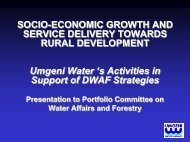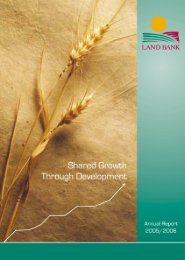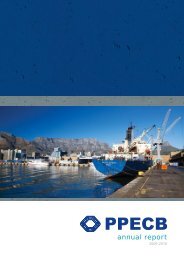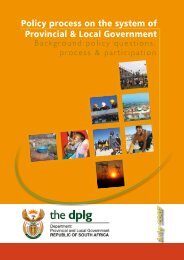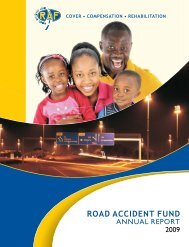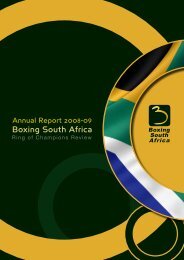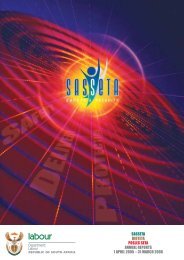Human Settlements Review - Parliamentary Monitoring Group
Human Settlements Review - Parliamentary Monitoring Group
Human Settlements Review - Parliamentary Monitoring Group
Create successful ePaper yourself
Turn your PDF publications into a flip-book with our unique Google optimized e-Paper software.
<strong>Human</strong> <strong>Settlements</strong> <strong>Review</strong>, Volume 1, Number 1, 2010<br />
We are living in a pessimistic period but<br />
the knowledge that change is necessary is<br />
perhaps grounds for optimism: maybe we do,<br />
at last, have the chance to make a better world.<br />
At the current moment then lots of normative<br />
shifts are underway as we know that we<br />
need radical change. We are thus living in<br />
momentous extraordinary times: times where<br />
we have remarkably little knowledge about<br />
the future; times when change is accelerating,<br />
and when the horror of what could happen if<br />
we do nothing and the brilliance of what we<br />
could achieve if we act can both, at times,<br />
be overwhelming. The current uncertainty,<br />
however, is also part of the challenge that<br />
makes the built environment professions<br />
such fascinating and absorbing professions.<br />
The work of designers and built environment<br />
professionals I would argue is thus entering a<br />
critical and most important phase.<br />
The human-nature split, or<br />
nature-culture divide – ecological<br />
unintelligence<br />
Bill Mc Kibben (2008, 19) argues that “partly<br />
we have failed to act because we have<br />
become pretty denatured.” “The economy<br />
seems more real to us than the ecosphere”<br />
(McKibben 2008, 20). Embedded within the<br />
mantra of sustainable development is a largely<br />
unquestioned embrace of the economic<br />
growth principles. There is a disconnection<br />
in Western thinking between the well-being<br />
of two intertwined life-systems – that of<br />
humans and the planet (Thompson 2008, 94).<br />
‘Development’ has become such a part of<br />
economic discourse that other renditions of its<br />
meaning we might bring to the table, renditions<br />
that would challenge and conflict with the<br />
prevailing discourse – for instance cultural<br />
development, personal development, spiritual<br />
development – are all too easily drowned or,<br />
at best marginalised. We have also failed to<br />
act as the problems are so big. In our modern<br />
western world we have learnt to break issues<br />
down into ever-smaller pieces and have<br />
separated nature and culture. Grappling with<br />
fundamental threats to creation, however,<br />
requires moving in the opposite direction.<br />
There is a lacking of a sense of the wholeness<br />
and interrelatedness of things. “Organicity<br />
must be reintroduced with a postmodern<br />
system where living systems are not reducible<br />
to components and where nature is considered<br />
to be alive” (O’Sullivan 2008, 140). “The awe<br />
and reverence toward nature, so prevalent in<br />
pre-modern worldviews, is totally absent in the<br />
modern world” (O’Sullivan 2008, 138).<br />
An either or thinking has historically governed<br />
our approaches, i.e. culture versus nature,<br />
civilisation versus wilderness, and city versus<br />
country. These oppositions are fierce and<br />
counterproductive and deserve much of the<br />
blame for the current bankruptcy of our current<br />
approach to the environment (Capra 1996;<br />
Orr 2004). According to Gregory Bateson,<br />
whom Fritjof Capra regards as one of the<br />
most influential thinkers of our time – our<br />
worldview is founded on an ‘epistemological<br />
error’, a perception or belief in separateness<br />
that makes it so. We need to attempt to move<br />
beyond this nature-culture impasse and merge<br />
development and conservation. One could<br />
argue that we have lost our sense of place in<br />
the world. In Ian McCallum’s (2005) words we<br />
have to stop speaking about the earth being in<br />
need of healing. The earth doesn’t need<br />
122



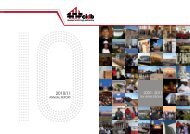
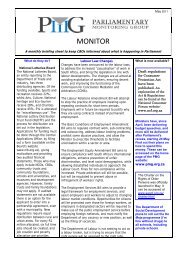
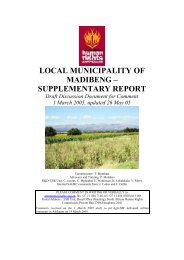
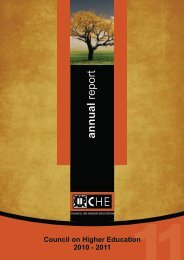
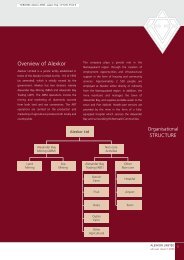
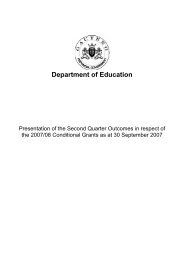
![National Research Foundation Annual Report 2008 / 2009 [Part 2]](https://img.yumpu.com/49774036/1/177x260/national-research-foundation-annual-report-2008-2009-part-2.jpg?quality=85)
